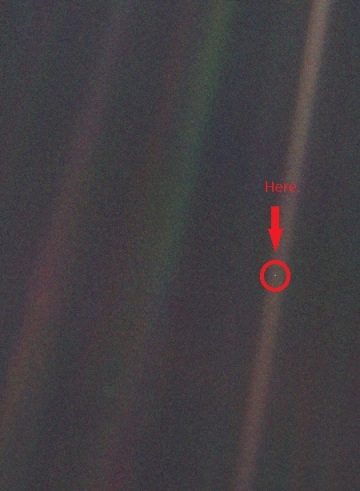
This is a rather old piece of writing where, basically, I started philosophising rather than going to bed. My best work it isn’t, but this is looking rather empty and, until I can gain access to my better writings, or finish my exams to free up time for new content, this is all I’ve got. Oh, and it was originally penned, so a couple of the more “meta” references are no longer apt. I shall, however, keep everything in the original form.
People never really think about the infinite, or the true, infinitesimal passage of time. It’s an idea often alluded to in literature, but it is only recognisable to those who have already traversed the concept.
Arguably the most obvious, and easiest to understand allusion was by Terry Pratchett, in Thief of Time. Pratchett raises the theory that his Discword is created and destroyed by an anthropomorphic Time. He states this must happen all the time, not second by second or millisecond by millisecond, but in the shortest time it is possible to have. “Consider the present. It must have a length, because one end of it is connected to the past and the other is connected to the future, and if it didn’t have a length then the present couldn’t exist at all. There would be no time for it to be the present in.” This, then, is called the ‘universal tick’ – the time it takes for the present to happen. Therefore, every time you blink, breathe, do anything at all, the universe you finish the action in is not, in a very real sense, the same one in which you started it.
Take this back to the real world, and change the metaphorical destruction and rebuilding of the world to the observation that things are always, always changing. Things age, decay, react, change on the smallest atomic level. Every time you read this is sentence it is, in an intangible way, a different sentence. The ink has changed, the paper. You, your knowledge, your experiences, your mood… As you can never cross the same river twice, nor can anything be experienced twice in the exact same way. Think about your journey to work, to school, to the local shop, or the pub. Think of all the variables. Every tiny thing. The traffic, the weather, your own mindset. The dog dirt on the pavement, the leaves on the trees… You will never walk, drive, cycle that same journey again.
Go outside, find a tree, a plant, a lawn. Look at it. Try and discover it, try to memorise every detail. This is the last time you will ever see it. Even as you were looking at it it was changing. Next time you pass it by, it will be an entirely different tree, and entirely different you, and, if you pay attention to the moment, an entirely different moment.
If every single thing we ever experience is temporary and unique, its own perfect moment in time, that makes it beautiful. The more you zoom in on the infinite, the more delicate and touchingly, almost achingly beautiful it can appear.
If zooming in and detailing things on a minute level makes everything significant, however, the opposite is also true.
If, instead of zooming in you zoom out toward the infinite, nothing really seems beautiful. In the long view, everything changes back to dust. In a large enough frame, everything is tiny.
Picture yourself, frozen in time, in your bedroom. Zoom out to your house. Your neighbourhood. Already most people would be hard pressed to point out their own exact location. Now your county. Your country. Now it’s hard to even point out your neighbourhood. The world. Our Solar System. The milky way. Now one of those tiny glowing dots contains everything here, still frozen in a moment, and odds are you don’t even know which dot it is. Now zoom out to the entire known universe. You’d have to be very familiar with the universe to point out our entire galaxy. To even get close. Think now of that one, tiny moment in time:
You in your bedroom. That moment is stretched out, the entire universe, everything, experiencing it simultaneously, frozen. That moment suddenly seems very thin, very stretched, very delicate. Everything you know, everything you have ever known, or ever will… in your imagined, frozen moment, all of it amounts to nothing. It does not even register, and everything is floating. It is all just objects in space.
And so, as this is also, unquestionably, true, everything is insignificant. Everything is tiny, everything is mainly space. Nothing is worth considering, and infinity is larger than it is possible to imagine. Time is everlasting and sooner or later everything and everybody returns to dust. From the same evidence, namely the scrutinisation of the nature of infinity, you can justify two, completely opposing views. Neither apparently flawed except by the existence of the other. How can such glaring contradictions both exist so irrefutably? How can both be true?
If anything, this can only be viewed as a cosmic version of the question, “is a glass half empty, or half full?” and, like that question, can never be answered to satisfaction.

Pingback: This Too Shall Pass | The Faces That You Meet